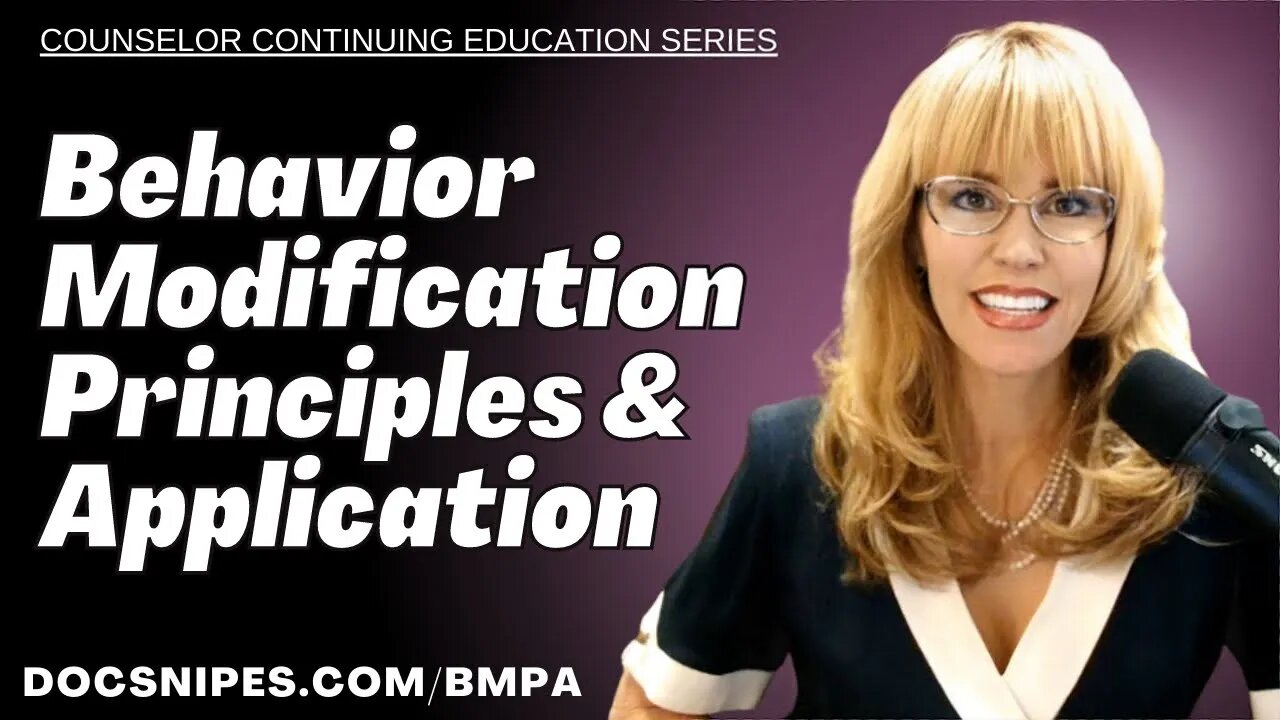Premium Only Content

Behavior Modification Basics | Counselor Education Webinar and NCE Review
Dr. Dawn-Elise Snipes is a Licensed Professional Counselor and Qualified Clinical Supervisor. She received her PhD in Mental Health Counseling from the University of Florida in 2002. In addition to being a practicing clinician, she has provided training to counselors, social workers, nurses and case managers internationally since 2006 through AllCEUs.com
📢SUBSCRIBE and click the BELL to get notified when new videos are uploaded.
If this video has helped you, please consider donating to support the channel Cashapp: 💲DocSnipes Paypal: https://DocSnipes.com/Donate YouTube: DocSnipes.com/Join
💻 Online course based on this video can be found at
https://AllCEUs.com Unlimited continuing education CEUs $59
⭐ Specialty Certificate Programs and Masterclasses in Case Management and Counselor Certification beginning at $89 https://AllCEUs.com/certificate-tracks
#Behavior #continuingeducation #change
#selfhelp #cognitivebehavioraltherapy #counseling #counselling
NOTE: ALL VIDEOS are for educational purposes only and are NOT a replacement for medical advice or counseling from a licensed professional.
Behavior modification is a psychological approach that helps people understand and change their behavior based on various stimuli and reinforcements. Dr. Dawn-Elise Snipes, the executive director of AllCEUs, explores the basics of behavior modification and its practical applications.
Behavior modification can be useful in identifying and addressing the causes of distress, understanding the triggers and rewards of certain behaviors, and empowering individuals to manage their reactions. Organisms learn behavior through direct and observational reinforcement and correction.
Humans learn to label internal experiences with feeling words, such as angry, scared, or happy. The context of a situation is key in determining how a person interprets their feelings and reactions. A person's response to stimuli can be traced back to survival instincts, such as fight, flee, forget, or repeat.
Basic behavior modification terms include unconditioned stimulus and response, conditioned stimulus and response, discriminative stimulus, generalization, and learned helplessness. These terms help explain how people respond to certain situations and the factors that contribute to their reactions.
Behavior modification techniques can be used to address various behaviors. Rewards and punishments can be emotional, mental, physical, social, spiritual, financial, or environmental. The decisional balance concept states that the more rewards that can be gained, the stronger the motivation to repeat the behavior.
Behavior strain, extinction burst, Premack principle, chaining, and shaping are other important terms in behavior modification. These concepts help understand how reinforcement or punishment may lose effectiveness over time, the temporary increase in a behavior when rewards are absent, pairing something undesirable with something desirable, the cascade effect leading to a behavior, and rewarding the successive approximations of the target behavior, respectively.
By using behavior modification principles, people can increase their sense of control, self-esteem, and learn to manage angry responses more effectively. This approach can also help people with addiction or mood disorders by reconditioning their responses, relabeling their emotional state, and using behavior substitution techniques. Understanding behavior modification can lead to more effective interventions and improved mental health outcomes for individuals.
AllCEUs.com provides multimedia counselor education and CEUs for LPCs, LMHCs, LMFTs and LCSWs as well as addiction counselor precertification training and continuing education on many of the videos on this channel. Unlike other providers like CE4Less, AllCEUs includes a weekly LIVE Stream Webinar with your unlimited continuing education and professional development membership.
CHAPTERS:
00:00 Behavior Modification Basics
00:46 Why Do I Care?
00:10 How can this be useful in practice
02:13 Example
04:07 Example 2
06:06 Example 3
08:35 Points
10:25 Basic Terms - Unconditional Stimulus
13:13 Basic Terms - Conditional Stimulus
17:35 Generalization
21:40 Fight or Flee
25:02 Conditioning
29:00 Conditioning: Repeat
32:25 Putting it Together
33:50 New Terms: Positive Reinforcement
35:44 New Terms: Negative Reinforcement
37:38 New Terms: Positive Punishment
40:24 New Terms: Negative Punishment
42:38 Decisional Balance
44:45 Apply It: Behavior 1
47:41 Apply It: Behavior 2
49:46 New Term: Behavior Strain
51:27 New Term: Extinction Burst
53:24 New Term: Premack Principle
53:51 Behavior Substitution / Response Prevention
55:12 New Term: Chaining
56:21 Chaining to Understand Responses 1
57:15 Chaining to Understand Responses 2
59:17 Chaining to Learn New Behaviors
1:01:14 New Term: Shaping
1:03:24 Apply It
1:04:32 Apply It 2
1:07:13 Points
1:08:50 Points 2
1:09:35 Summary
-
 8:52
8:52
DocSnipes
1 year agoHow Cognitive Distortions Contribute to Violence
216 -
 13:02
13:02
China Uncensored
1 hour agoChina is Ready to Strike Japan
3147 -
 14:37
14:37
Tactical Considerations
8 hours ago $0.02 earnedModern Lever Action Henry Big Boy X By Mad Pig Customs
1761 -
 1:03:13
1:03:13
In The Litter Box w/ Jewels & Catturd
22 hours agoTRUMP HOLDS DEMS ACCOUNTABLE | In the Litter Box w/ Jewels & Catturd – Ep. 757 – 3/7/2025
43.9K11 -
 1:02:27
1:02:27
Vigilant News Network
3 hours agoGlobalist TAKEOVER? BlackRock Buying Panama Canal for $22.8 BILLION | The Daily Dose
30.4K7 -
 57:25
57:25
Crypto Power Hour
10 hours ago $1.09 earnedThe Crypto Power Hour - ‘In Crypto We Trust’ DC Crypto Summit
29.6K5 -
 46:36
46:36
Mally_Mouse
3 hours agoLet's Play!! -- Jak 2! pt. 6
32.1K1 -
 2:04:21
2:04:21
Tim Pool
7 hours agoAmerica's Obesity & Health Crisis, MAKE AMERICA HEALTHY AGAIN | The Culture War with Tim Pool
121K42 -
 1:00:20
1:00:20
The Tom Renz Show
5 hours agoCDC Will Study Link Between Vaccines and Autism, AOC Says Musk is Unintelligent & SDNY
56.7K31 -
 59:53
59:53
Ben Shapiro
5 hours agoEp. 2153 - The Democratic Collapse CONTINUES!
87.9K61